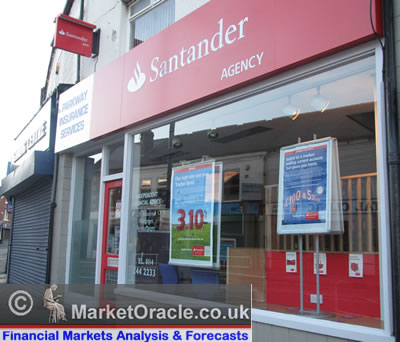Euro-Zone PIIGS Greece Default Bank Run Contagion Risk - Santander Anyone?
Personal_Finance / UK Banking Jun 20, 2011 - 07:03 AM GMTBy: Nadeem_Walayat
 The Greeks had set the ball rolling by withdrawing their funds out of their banks during May and June as a consequence of their exposure to Greek Government debt, soon to be followed by Banks across Europe if not already in the process of desperately attempting to pull their funds out of Greek banks ahead of an inevitable debt default, and then from other PIIGS banks and financials, that's banks of Portugal, Ireland, Italy, and Spain as well as Greece on rising default contagion risk.
The Greeks had set the ball rolling by withdrawing their funds out of their banks during May and June as a consequence of their exposure to Greek Government debt, soon to be followed by Banks across Europe if not already in the process of desperately attempting to pull their funds out of Greek banks ahead of an inevitable debt default, and then from other PIIGS banks and financials, that's banks of Portugal, Ireland, Italy, and Spain as well as Greece on rising default contagion risk.
 Over the past 3 years, Santander and other foreign banks have been allowed to run amok amidst Britain's retail banking sector as a consequence of an incompetent regulator and a desperate Labour government eager for anyone to take on the responsibility of restructuring a string of bankrupt UK banks which allowed Santander to gobble up a string of small to medium sized UK banks such as Bradford and Bingley, Abbey and Alliance and Leicester, which now pose a real risk to UK depositors.
Over the past 3 years, Santander and other foreign banks have been allowed to run amok amidst Britain's retail banking sector as a consequence of an incompetent regulator and a desperate Labour government eager for anyone to take on the responsibility of restructuring a string of bankrupt UK banks which allowed Santander to gobble up a string of small to medium sized UK banks such as Bradford and Bingley, Abbey and Alliance and Leicester, which now pose a real risk to UK depositors.
One can measure the rising contagion risks in the credit default swaps market, where the price of insuring against Santander bonds against default has been steadily on a rise since March 2011. This increasing risk is also manifesting itself in the yield of Spanish government debt that has hit an 11 year high of 5.75% on 10 year bonds, which stands nearly 3% above German Bund's, a financing level that is not sustainable for Spain, let alone a further surge in yields that would follow a Greek debt default.
The rise of euro-zone default risks, risks another credit markets freeze as the banks of countries such as Britain that do not face default by virtue of its ability to print money and inflate, increasingly pull the plug on financing of euro-zone banks much as occurred following the freezing of the credit markets in August 2007. Similarly UK retail customers would also be wise to limit exposure to euro-zone banks, especially of peripheral nations (PIIGS).
Breaking Up the PIIGS Banks
It is my opinion that at some point in time the British Government will force PIIGS banks such as Santander to sell off their British banking arms so as to ensure contagion risks to Britain's banking system are reduced, that is really the only solution to prevent a run on the UK banking system as occurred in September 2007 with Northern Rock and threatened to occur in Sept 2008. A break-up of the banks in itself would trigger a major credit market event, therefore it is probably going to take place in secret behind closed doors to prevent financial panic, i.e. British banking arms will be floated under the pretense of raising capital, which on balance would be market calming measure.
Safe Banks
The stronger banks that would survive a series of PIIGS defaults for at least some time are HSBC and to a lesser extent Barclays. There is also the government run National Savings bank that would remain secure for the duration of a banking crises, though the government owned Northern Rock would probably not be 100% secure and thus deposits there would also suffer to a similar extent of only being guaranteed to £85k.
If for whatever reason you have to have funds in excess of £85k with a high risk bank then you need to ensure you have a plan to move funds at short notice, practice the procedures, of where you will move funds to i.e. taking note of the banking groups. So even if you have no need of an account with the likes of HSBC Bank, it may be worth opening an account ready to transfer funds to in case of a banking sector emergency.
Depositors Protect Yourselves From Potential Banking System Crisis
UK bank depositors need to prepare for the worst case scenario in what may follow a Greece debt default and contagion snowballing across Europe's financial system. UK bank account holders have been receiving mail shots from their banks over the past 6 months informing them of the protection of their deposits upto a value of £85,000 per individual customers across the banking group. This should not be treated as junk mail but rather banks being forced to lay the ground work for the real risk of defaulting on deposits as a consequence of the bankruptcy of peripheral Euro-zone countries starting with Greece. Remember Greece going bankrupt is not a question of IF but rather when.
Therefore savers with amounts deposited above the guaranteed limit need to ensure that they have measures in place well ahead of a banking crisis to ensure that they survive one both in terms of the ability to transact business as well as ensuring total funds exposed are LESS than the £85k banking limits at the time of a bank run.
Scare Mongering ?
Am I scare mongering? Try asking those that were locked out of their savings accounts when the Icelandic banks went bust during October 2008. The banks froze UK customers out of their accounts on the 7th of October 2008. My analysis of 2nd October 2008 had warned that small countries such as Iceland were at risk of going bankrupt, with Iceland's bankruptcy preceded by some 24 hours earlier by Iceland Going Bankrupt?, - "savers should at the first opportunity seek to repatriate their savings to a 100% UK bank as the consequences of a country going bankrupt could render guarantees meaningless".

Steps You Need to Take Now !
The situation is literally critical with a possible default imminent and bank runs probable even if Greece is bailed out again as a consequence of future inevitable default due to the ramping up of Debt to GDP ratios.
1. Ensure that you have at least 2 current accounts across banking groups and at least one with a safe bank such as HSBC.
2. Next make a list of all of your deposit / bank accounts, with the amounts on deposit.
3. Now group your accounts by banking sector group (see list at end of this article as a guide).
4. If you are anywhere near the £85k limit with any banking group then move those excess funds immediately!
5. Consider transferring funds to your spouse so as utilise their compensation limit across a banking group.
6. Ensure you have procedures in place so that you can at short notice transfer funds from high risk banks to lower risk banks so as to limit the fallout from any banking system crisis.
7. Do not have ANY savings are fixed deposit exposure to banks that do not fall under the UK Financials Services Compensation Scheme.
8. Limit exposure to PIIGS banks, that is Greece, Ireland, Spain, Portugal and Italy as these are at the most risk of going bust thus triggering a lengthy process for savers having to wait for compensation.
9. Keep enough in cash to cover at least 1 months expenditure, (I keep 2 months worth of cash).
The following list represents Britians' largest deposit taking banking groups and the banks that fall under each.
Savers Pay For Low Risk
Savers preparing to cut their risk by switching banks will be disappointed to learn that the safest banks also pay the worst interest rates on deposits, typically less than 2% gross and often below 0.5% on instant access accounts, similarly the highest risk banks pay the best rates (typically 3%), which is further evidence of a market that is geared towards the risk of default and therefore higher risk banks are more desperate to attract retail deposits.
Banking Groups
Note whilst banking groups may have multiple licences as a consequence of mergers and takeovers, however they also may be in the process of merging licences so for ultimate safety one should remain focused on banking groups.
LLOYDS BANKING GROUP
- Lloyds TSB Bank
- AA Savings
- Bank of Scotland / HBOS
- Birmingham Midshires
- Capital Bank
- Cheltenham & Gloucester Savings
- Halifax
- Intelligent Finance
- Saga
SANTANDER GROUP
- Santander bank
- Abbey National
- Asda Savings
- Alliance and Leicester
- Bradford and Bingley
- Cahoot
- Moneyback
- Honycomb
Nationwide Building Society
- Nationwide Building Society
- Cheshire Building Society
- Derbyshire Building Society
- Dunfermline Building Society
BARCLAYS GROUP
- Barclays Bank
- Standardlife Bank
HSBC GROUP
- HSBC Bank
- First Direct
- Marks and Spencer Financial
ALLIED IRISH GROUP
- Allied Irish Bank
- First Trust
CITI GROUP
- Citibank
- Egg
CO-OPERATIVE GROUP
- Co-operative Bank
- Britannia
- Smile
- Unity Trust Bank
RBS Group
- Royal Bank of Scotland
- Nat West Bank
- Direct Line Savings
- Lombard
- The One Account
- Drummonds
- Ulster Bank
Additional comments
- Foreign Banks under UK FSCS Scheme - ICICI (India), First Save (Nigeria)
- Small business are covered by the FSCS on the basis of 2 of following 3 conditions - upto a turnover of 6.5 million, less than 50 employees, balance sheet total not more than £3.26 million
Banks not under the UK FSCS.
-
ING Direct, Tridos - Dutch
- Anglo Irish, Bank of Ireland - Ireland
Don't delay! Act today to form a quick personal savings protection contingency plan, otherwise you may wake up one day to find yourselves locked out of your funds Iceland style!
For more on how to protect your wealth from debt default bankruptcy see the Inflation Mega-trend Ebook (FREE DOWNLOAD)
Source and Comments: http://www.marketoracle.co.uk/Article28791.html
By Nadeem Walayat
Copyright © 2005-2011 Marketoracle.co.uk (Market Oracle Ltd). All rights reserved.
Nadeem Walayat has over 25 years experience of trading derivatives, portfolio management and analysing the financial markets, including one of few who both anticipated and Beat the 1987 Crash. Nadeem's forward looking analysis focuses on UK inflation, economy, interest rates and housing market. He is the author of three ebook's - The Inflation Mega-Trend; The Interest Rate Mega-Trend and The Stocks Stealth Bull Market Update 2011 that can be downloaded for Free.
Nadeem is the Editor of The Market Oracle, a FREE Daily Financial Markets Analysis & Forecasting online publication that presents in-depth analysis from over 600 experienced analysts on a range of views of the probable direction of the financial markets, thus enabling our readers to arrive at an informed opinion on future market direction. http://www.marketoracle.co.uk
Disclaimer: The above is a matter of opinion provided for general information purposes only and is not intended as investment advice. Information and analysis above are derived from sources and utilising methods believed to be reliable, but we cannot accept responsibility for any trading losses you may incur as a result of this analysis. Individuals should consult with their personal financial advisors before engaging in any trading activities.
Nadeem Walayat Archive |
© 2005-2022 http://www.MarketOracle.co.uk - The Market Oracle is a FREE Daily Financial Markets Analysis & Forecasting online publication.






